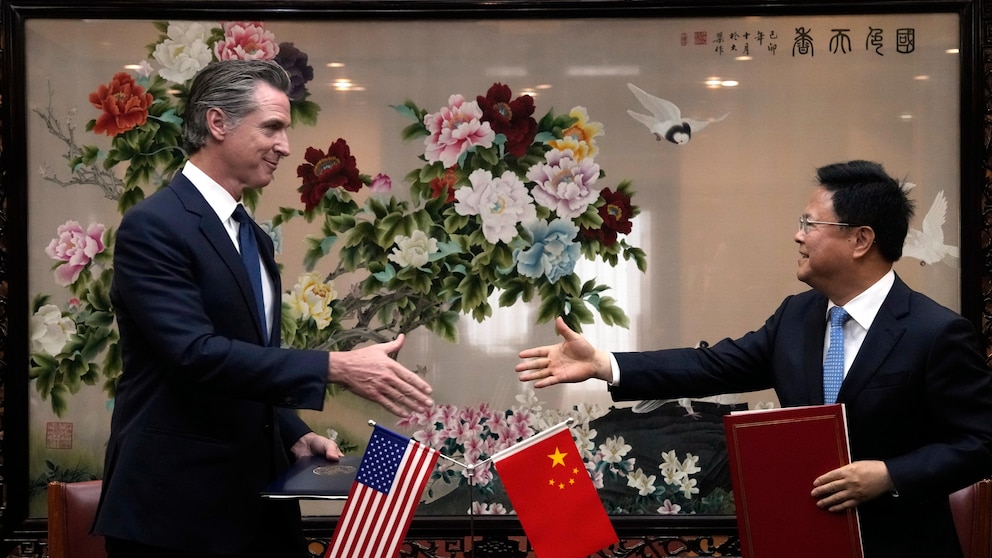
BANGKOK — BANGKOK (AP) — California Gov. Gavin Newsom had a surprise meeting with Chinese leader Xi Jinping in Beijing on Wednesday after being warmly welcomed by other senior leaders in a display of friendliness that stands in sharp contrast to the dialogue between the United States and China in recent years.
The governor is on a weeklong tour of China, where he plans to push for climate cooperation. Newsom's trip as governor, once considered routine, is drawing attention as it comes after years of heightening tensions between the U.S. and China.
“I’m here in expectation, as you suggest, of turning the page, of renewing our friendship and reengaging (on) foundational and fundamental issues that will determine our collective faith in the future,” Newsom said in brief opening remarks ahead of his meeting with Wang Yi, China's top diplomat, earlier in the day.
Though Newsom was in China to promote cooperation in curbing climate change, Chinese officials took the opportunity in welcome speeches ahead of the closed-door meetings to talk about U.S.-China relations. Wang is preparing to visit the U.S. on Thursday.
Newsom and Xi discussed ways to “accelerate our progress on climate in meaningful and substantive ways,” the California governor said at a news conference, but did not mention more specifics.
They also talked about fentanyl, a synthetic drug and leading killer of young people in the U.S., and China’s role in combating the transnational shipping of precursor chemicals, Newsom said.
According to China's state broadcaster CCTV, Xi told Newsom: “I hope your visit will enhance mutual understanding between the two sides and play a positive role in expanding cooperation between China and California and promoting the healthy and stable development of Sino-U.S. relations."
Xi may attend the Asia-Pacific Economic Cooperation summit in San Francisco next month and meet with U.S. President Joe Biden, although China has not formally confirmed his attendance.
Newsom is visiting Hong Kong, Beijing, Shanghai and the provinces of Guangdong and Jiangsu. At a speech at Hong Kong University on Monday, he promised to continue to cooperate on climate change regardless of the outcome of the next U.S. presidential election.
He said he raised human rights issues with Wang and the two also discussed Taiwan, a red-line issue for Beijing. China claims the self-ruled island as part of its own territory.
“I expressed my support for the One-China policy … as well as our desire not to see independence,” Newsom said, referring to the official U.S. policy that recognizes the Communist Party as the ruling government of China. Officially, the U.S. does not recognize Taiwan but is its biggest unofficial ally.
Wang, the head of the Communist Party’s office of foreign affairs, said he knows Newsom's trip attracted plenty of critics but that he views the trip positively.
“But I think time and facts will certainly prove that your visit to China is in line with California people’s wishes and in line with the American people’s interests and the expectations of the global society.”
Newsom also met Wednesday with Vice President Han Zheng, who greeted him with a wide smile and called him an “old friend.” Han is a past member of the Politburo Standing Committee, an elite group of leaders within the party.
“The China-U.S. relationship is the most important bilateral relationship in the world, and the sub-national cooperation is an indispensable part to facilitate the sound and steady growth of China-U.S. relations," Han said. “I’m sure your weeklong trip will inject positive energy to the development of the China-U.S. relationship.”
The governor met as well with the head of China's National Development and Reform Commission, a Cabinet-level agency responsible for economic policies. They signed a memorandum on deepening cooperation in environmental issues.
Governors of California, which has an economy larger than most countries, have a long history of climate collaboration with China. Democrat Jerry Brown and Republican Arnold Schwarzenegger also traveled to China to swap knowledge on reducing air pollution and emissions.
Since leaving office, Brown launched the California-China Climate Institute at the University of California, Berkeley.
Sourse: abcnews.go.com






